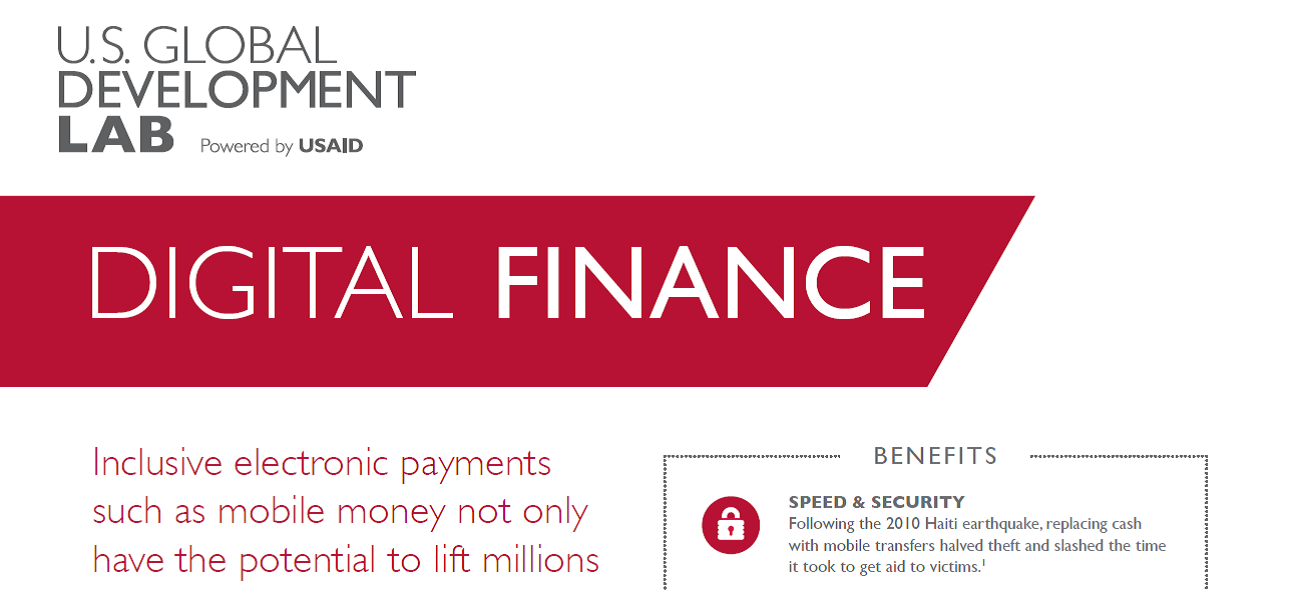Speeches Shim
Digital Finance Fact Sheet ![]() (pdf - 1 MB)
(pdf - 1 MB)
Inclusive electronic payments such as mobile money not only have the potential to lift millions out of poverty, but can also improve governance by reducing costs and increasing transparency.
With the push of a button, and often through a basic mobile phone, inclusive electronic payments can eliminate the corruption, inefficiencies, and security risks of cash payments. New “branchless” banking models, enabled by the broad reach of mobile phone infrastructure, are reinventing financial services—once the exclusive domain of the rich—and offer the 2.5 billion unbanked people worldwide the opportunity to take control of their finances. Mobile phones can supply families with access to products like savings accounts, insurance, and credit—indispensable tools for lifting families out of poverty and connecting them to the formal economy.
Benefits:
SPEED & SECURITY
Following the 2010 Haiti earthquake, replacing cash with mobile transfers halved theft and slashed the time it took to get aid to victims.
FINANCIAL INCLUSION & RESILIENCE
Research suggests Kenyan families who do not use M-Pesa—the largest mobile money system in the world—suffer a 7 percent drop in consumption when hit with a negative income shock, while consumption of families who use M-Pesa remains unaffected.
TRANSPARENCY & ACCOUNTABILITY
Afghan police officers saw a 30 percent increase in take-home pay when mobile payments replaced cash—simply by reducing opportunities for skimming and eliminating the cost of handling cash.
COST SAVINGS
Research estimates connecting every Indian household to a digital payment system and automating government flows could save the government $22 billion per year.
PLATFORMS FOR INNOVATION
New businesses are emerging across the developing world that use mobile payments to provide solutions to the poor in energy, water, sanitation, health, agriculture, and other sectors.
Building Transparency in Afghanistan:
Corruption weakens institutions, disempowers citizens, and undermines stability. To instill transparency in public sector spending, governments can use mobile money to automate payment delivery and produce a complete transaction record. In 2010, Afghanistan’s government began paying police officers through mobile money. Officers thought they had received a 30 percent raise, when in fact they were finally receiving their full salary. The government is now in the process of adopting mobile technology to replace cash payments and collections for civil servant salaries and electricity bills.
Transforming Government and Expanding Financial Inclusion in the Philippines
The Philippines has more than 7,100 islands, making it challenging to access a brick and mortar bank or government office in certain parts of the country. USAID works with banks, the government, and mobile network operators to expand mobile financial services to these hard-to-reach areas. To date, more than 10 million Filipinos have gained access to more efficient financial services. The Government of the Philippines is also encouraging agencies to adopt electronic payment systems as a way to increase efficiency and introduce greater transparency in government financial transactions. With the support of USAID/ Philippines’ Scaling Innovations in Mobile Money Project, one municipality has already adopted electronic payments for its payroll disbursements, and three other cities are poised to launch mobile-enabled payment and collection systems for taxes, utilities, and social transfers.
Better Than Cash Alliance (BTCA)
USAID and the diverse set of BTCA members—including governments, companies, and NGOs—are developing and sharing tools to promote the shift from cash to electronic payments. Achievements by BTCA members include:
- Colombia’s Familias en Accion disperse bimonthly benefits to 2.4 million households. Within two years, 91 percent of recipients had a card-linked bank account.
- Mercy Corps cut theft of social transfers by 50 percent in Haiti using e-payments.
- In response to a devastating drought, the World Food Programme quickly sent money via mobile phones to 100,000+ hungry farmers in Malawi.
About Digital Development
USAID's Digital Development Team fosters transformative and market-driven solutions to empower individuals through financial inclusion, data-driven evidence, and access to mobile technology. We offer knowledge tools and support to dramatically increase the adoption of mobile technology throughout USAID’s programs, and we partner with other donors, governments, companies, and NGOs to accelerate proven solutions that impact millions.
FIND OUT MORE
References


Comment
Make a general inquiry or suggest an improvement.